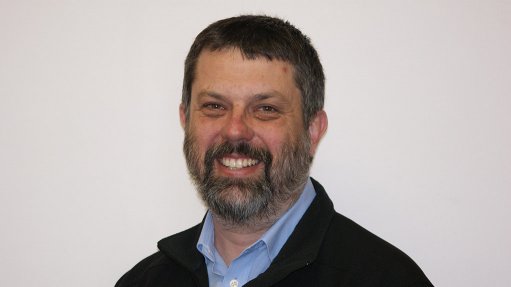
DECLAN VOGT South Africa needs to urgently build a new cohort of mining researchers to further the country’s mechanised mining vision
The South African mining industry must mechanise its operations and research has a crucial role to play in helping industry to get there, says Centre for Mechanised Mining Systems (CMMS) director Dr Declan Vogt.
He highlights that the country urgently needs to build a new cohort of mining researchers and that the Wits School of Mining Engineering, which houses the CMMS, is able to aid in doing so.
The newly appointed Vogt, who joined the CMMS from the Council for Scientific and Industrial Research, says South Africa has allowed some segments of its mining industry to deteriorate. “We have seen a tremendous drop in productivity and that is making us uncompetitive. We are now under enormous pressure to become more productive.”
At the same time, there has been a decline in the quality and quantity of mining research, beginning in the 1990s when mining companies began to experience economic pressure owing to the drop in the gold price and research became seen as an unnecessary overhead.
In addition, political transformation meant that companies could invest offshore, in countries with easily accessible reserves, and did not need to conduct the research necessary to drill for deeper deposits in South Africa.
As a result, there is an urgent need for mining research in South Africa, particularly around mechanisation, and Vogt sees the CMMS as the starting place for where mining research in South Africa is set to go.
He says that in addition to conducting research, the CMMS has an important role to play in training middle managers. This is because, whereas senior executives of mining companies understand the benefits of mechanisation, and operators undergo training that can be tailored towards mechanisation, the middle managers are used to working on sites with large numbers of people rather than capital intensive machinery and can find it difficult to adapt.
This is one of the reasons why the CMMS is taking a systems approach. The centre recognises that most attempts to introduce mechanised mining have been systems failures and that it is important to take into account human behaviour when introducing changes.
Vogt says that one of his biggest challenges in his new role will be to ensure that the centre demonstrates its value and attracts more funding by meeting the needs of its sponsors, which include mining majors such as Anglo American, Anglo American Platinum and Impala Platinum.
“We have got to sell them on looking at systems and redesigning operations. At the moment they are redesigning manual processes, and while this has value, they will really see benefits if they take a clean sheet,” says Vogt.
His chances of realising the mechanised mining vision are good since most major mining companies announced at the beginning of the year that the future was mechanisation and affirmed their commitment to the process. “They are really starting to understand the urgency,” he says.